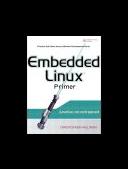Книга: Embedded Linux Primer: A Practical, Real-World Approach
8.1.3. Minimal Device Driver Example
8.1.3. Minimal Device Driver Example
Because Linux supports loadable device drivers, it is relatively easy to demonstrate a simple device driver skeleton. Listing 8-1 illustrates a loadable device driver module that contains the bare minimum structure to be loaded and unloaded by a running kernel.
Listing 8-1. Minimal Device Driver
/* Example Minimal Character Device Driver */
#include <linux/module.h>
static int __init hello_init(void) {
printk("Hello Example Initn");
return 0;
}
static void __exit hello_exit(void) {
printk("Hello Example Exitn");
}
module_init(hello_init);
module_exit(hello_exit);
MODULE_AUTHOR("Chris Hallinan");
MODULE_DESCRIPTION("Hello World Example");
MODULE_LICENSE("GPL");
The skeletal driver in Listing 8-1 contains enough structure for the kernel to load and unload the driver, and to invoke the initialization and exit routines. Let's look at how this is done because it illustrates some important high-level concepts that are useful for device driver development.
A device driver is a special kind of binary module. Unlike a stand-alone binary executable application, a device driver cannot be simply executed from a command prompt. The 2.6 kernel series requires that the binary be in a special "kernel object" format. When properly built, the device driver binary module contains a .ko suffix. The build steps and compiler options required to create the .ko module object can be quite complex. Here we outline a set of steps to harness the power of the Linux kernel build system without requiring you to become an expert in it, which is beyond the scope of this book.
- 8.1. Device Driver Concepts
- Building a Device Driver
- JDBC Туре 4 DRIVER
- Chapter 14. Example scripts
- Appendix J. Example scripts code-base
- Example NAT machine in theory
- example rc.firewall
- Example rc.firewall script
- Example rc.DMZ.firewall script
- Example rc.UTIN.firewall script
- Example rc.DHCP.firewall script
- Example rc.flush-iptables script




